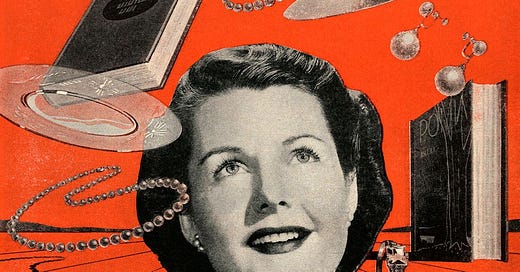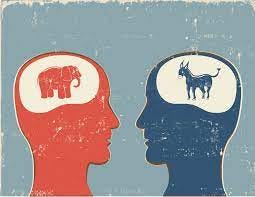Edition #89: You Don't Need More Stuff
Plus, Wes Anderson's world, a political biases test, and mundane Halloween costumes
A Note From the Editor
There is a scenario I have experienced several times in the past, but I only paused to pay closer attention to it last week. It goes something like this: I wake up, brush my teeth, wash my face, and open my closet and attempt to get dressed. I thumb through my clothing—there’s a decent bit of it, some new stuff, some cheap stuff, some overpriced stuff I slyly refer to as “investment pieces'. As I begin to try things on, I grow increasingly irritated because everything looks terrible. After the fifth attempt to construct an outfit that makes me feel good, I resign to the fact that no matter what I wear, I’m going to look stupid because all my clothes suck. I think, I need new clothes and I need them now. When’s the last time I really updated my wardrobe? Could I get rid of everything and start over, how much would that cost? On those days, I leave my apartment tetchy and ferociously ungrateful. I chastise myself for not taking shopping seriously enough, for not curating a wardrobe of timeless staples by now, at the edge of 30.
Except this time the experience was different, because for once I was able to step back from it. I wondered where this feeling was coming from, as I had been feeling perfectly content with my wardrobe in the weeks prior. After doing some Googling I was not surprised to discover research shows direct links between materialism and low self-esteem; we buy things to make us feel better or to distract us from our negative feelings. I am on the brink of a major life change with financial implications, and though I do not feel stressed about it in my walking days there are undoubtedly some unsettled, insecure feelings lurking in my subconscious. It felt good to process the situation this way, to notice a bad feeling before it held my entire day and self worth hostage.
The experience got me thinking about consumerism, our very American obsession with buying stuff. Though our country continues to splinter in two, unable to agree upon whether families deserve paid leave and whether women should have the right to choose what to do with their bodies, the one thing we can agree on is that it is okay to buy as much stuff as you want, however often you want. If you have the money, buy it! It is not your job to think before swiping your card or one-click purchasing, and it is certainly not on you to worry about where this item came from and how it got to your doorstep.
I understand it, too. We buy a lot of stuff and it feels impossible to imagine trying to shop ethically. What does that even mean, for one? And what can we do about where items are manufactured, or the working state of those factories? And what if we don’t have the resources to buy a $300 sweater that was hand stitched by a woman making a living wage? The accumulation of these (valid) factors causes our brain shut off entirely to the issue. It reminds me of the climate change conversation, how it is so large and looming that I hear many people say “Corporations should do more to curb climate change!” without taking any individual ownership of their part in the disaster. When problems are too big, we feel far too small. Too small to make any difference.
In a recent article from The Atlantic, writer Amanda Mull brings a point to the consumerism conversation I hadn’t paid much attention to before—the supply chain. If ethically shopping is too daunting of a task to undertake, or too massive of a problem to see our individual affects on, then the supply chain is the younger sibling in our own backyard. Because of all the stuff we buy, the supply chain is under immense stress. It has been since people began to stockpile during COVID, and it got worse when white collar workers accumulated discretionary income that normally would have been spent on other things, like going on vacation. Add the extra money to the feelings of insecurity we all faced in the wake of the pandemic and you have a hyper-stressed supply chain that cannot possibly keep up with purchase demand.
Forget for a moment the human beings behind the work, those who do perform the difficult manual labor of hauling goods out of container ports while making low wages and destroying their bodies. Instead, think of the situation as a basic math equation. There are only so many loading docks, so much truck space, so many workers to perform this kind of work. Despite our belief that if we have the money we should be entitled to have anything we want the moment we want it, the logistical resources needed to get the things to us are, in fact, limited. The same resources needed to keep up with our shopping addiction are also needed in other parts of the economy—to get lunch supplies to schools, for example. In true American fashion, profit is king. No one is minding this process, ensuring the more morally important task (food supplies making it to schools) is prioritized over Isabel from New Jersey getting that new throw blanket she ordered. Or, as the article puts it,
“In a system asked to function beyond its capacity, if the distributor of hundred-dollar throw pillows can pay more for access to trucking capacity than a local food distributor that serves schools can, then their pillows go on the truck.”
No one is going to stop shopping and it would be unreasonable to ask anyone to do so. But when presented with a problematic scenario of which I am a contributor, I have to consider my role in the problem. How do my behaviors affect the system, and am I contributing to the stressors or helping to alleviate them? I think a common response to the aforementioned scenario would be something to the tune of, “They should just hire more truckers! It’s not my problem.” But it is your problem, and mine, and all of ours. If we are contributing to a problem, then we should be obliged to contribute to the solution. We have a responsibility to do so, because who else is going to clean up our mess? To assume the burden will fall on for-profit corporations who are solely focused on making more money is to live in denial. I’ve said it before and I’ll say it again; we cannot see sparks of a fire catching around us and claim to be shocked, later, when the house burns down.
For my part, I’m going to deeply consider how my purchasing behaviors ebb and flow, particularly during the holiday season when demand is at its highest. That starts with pausing before buying, considering whether the thing I’m purchasing is something I need or whether I’m just feeling bad and wanting to self-soothe. I thought about whether it would be possible to do a purchase-free November—buying groceries and household essentials but nothing else. I could re-invest that money in something I care about, like buying tickets to the on and off Broadway shows I’ve been dying to see. Doing so would enable me to use my wallet to support a community I care about versus accumulating more junk. In America, spending your money with the utmost intention should be considered a new baseline method of operation. Your wallet is one of your greatest forms of protest.
Cheers, my dears, and as always thank you for reading. I ordered this book even before thinking about today's essay topic, and I am now extra excited to start it. I’d be curious to hear about your relationship with shopping and whether a no-purchase time period experiment resonates with you. And if you liked what you read today, please consider sharing it with a loved one.
Three Pieces of Content Worth Consuming
It’s Quitting Season. This one isn't exclusively about quitting our jobs; it's a macro commentary on quitting in general. America has a long, complicated relationship with quitting the skews negative, often framing the choice to walk away from something that isn’t working as “weak”. But forcing yourself through something you don't want only distracts you from the things you do want, and it is no heroic effort to waste your life. And the canon of quitting-media in the wake of COVID continues!
In the Company of Wes Anderson. I'll admit that I haven't seen many of his films, but I understand Wes Anderson as an enigma of the cinematic universe. This piece explores why so many big-time actors continue to flock to Anderson’s casts, and after reading it I wished I could be part of these tight-knit, motley crews. I particularly enjoyed hearing the actors talk about what background research Anderson required of them for their respective characters in his latest film, French Dispatch (reading Mavis Gallant's short stories, for examples). I was also pleased to learn the entire cast of his films has nightly dinner together every night during filming.
Working Through the Layers of My Grief at My Local Asian Spa. A beautiful essay that broke my heart, but that also left me with a glimmer of hope. Writer and internet friend of mine, Anna Haines, explores how a weekly visit to a no-frills massage parlor helped her navigate the astounding pain of losing her mother. One line in particular brought tears to my eyes: "But to remain untouchable won’t protect me from heartbreak.” There is something so intimate about the exchange between a masseuse and a customer; you reveal your mental state to this stranger without words, through the tensions in your body, and they help you through to the other side.
Perhaps You Should… Take This Political Biases Test
Clearer thinking has the most interest tests and I particularly loved this one. I discovered I was 75% less politically bias than others (hooray!) but that I have a shallow understanding of America's economic stance (lol). This feels like a good basis for a discussion with those people you love who fall on a different side of the political spectrum than you.
**Bonus Content** (Mundane Costumes)
As the Halloween week chaos ensues, I am reminded how little effort I am willing to devote to putting together a costume. I was delighted to learn about the “Mundane Halloween” parties that take place in Taiwan and Japan every year. A trend I would gladly get behind!
A Quote From A Book You Should Read:
“I know that people can be better than they are. We are capable of bearing a great burden, once we discover that the burden is reality and arrive where reality is.”
-The Fire Next Time by James Baldwin
This newsletter is best served with a side of conversation, so drop your opinions, reflections, and thoughts in the comments below and let’s get to talking.
Or, share the most thought-provoking piece from today’s edition with someone you love, then call them up to discuss, debate, and percolate. As a wise woman once said, “Great minds discuss ideas.







I was just having these thoughts this week and couldn’t put into words my addiction to buying. Most recently I was waiting to get my car serviced and was car shopping the lot, when I decided I didn’t need a new car at that price I felt the urge to buy that dress I had my eye on because I had just “saved” so much money - why am I sick like this?
Thank you for this and thank you for the perspective on doing our parts.
It's never been a better time to shop vintage ;)